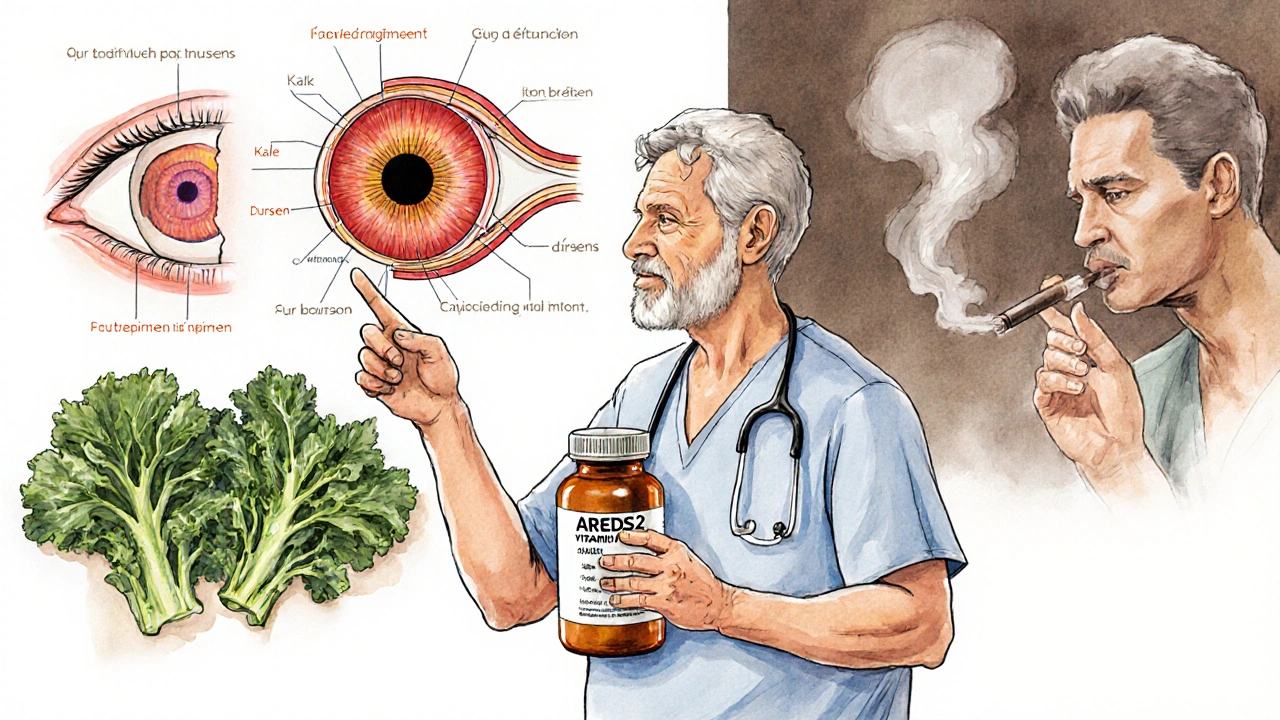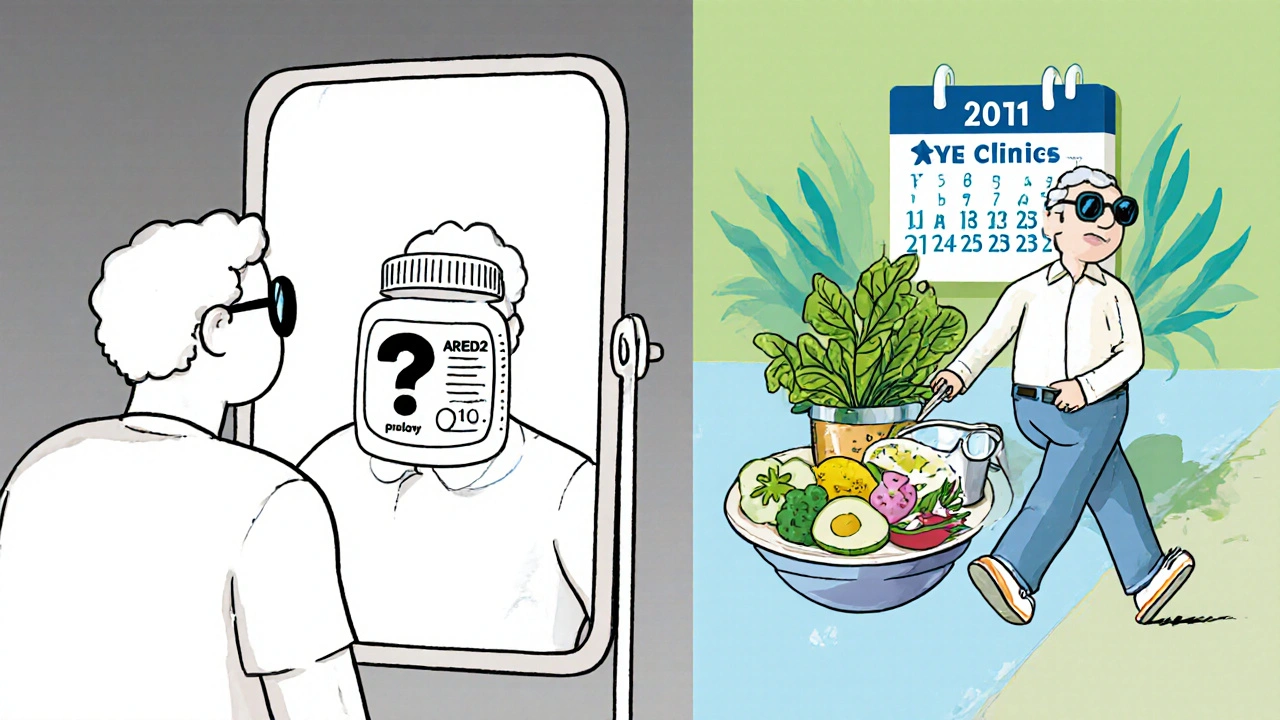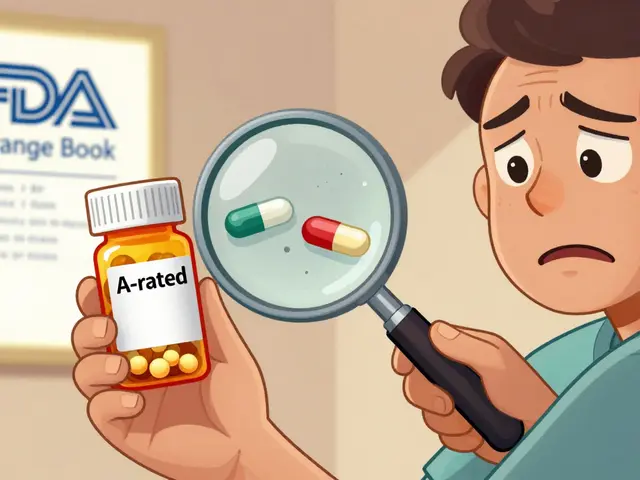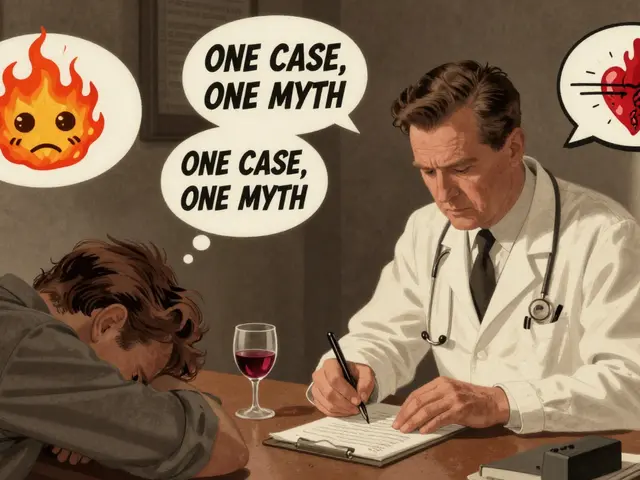
If you’ve been told you have intermediate age-related macular degeneration (AMD), you might have been handed a bottle of vitamins and told to take them daily. But are these supplements really worth it? And if you have early AMD-or no AMD at all-should you be popping them too? The answer isn’t simple, but the science is clear: AREDS2 vitamins work for a very specific group of people, and they do nothing for everyone else.
What Are AREDS2 Vitamins?
The AREDS2 formula isn’t just another multivitamin. It’s a precise combination of nutrients tested in a decade-long clinical trial by the National Eye Institute. This isn’t guesswork. It’s evidence-based medicine.
The formula includes:
- 500 mg of vitamin C
- 400 IU of vitamin E
- 10 mg of lutein
- 2 mg of zeaxanthin
- 80 mg of zinc (as zinc oxide)
- 2 mg of copper (as cupric oxide)
That’s it. No omega-3s. No selenium. No other antioxidants. Just these six ingredients, in these exact amounts. Why? Because the AREDS2 trial tested hundreds of combinations-and this one delivered the best results with the least risk.
The original AREDS formula (from 2001) included beta carotene. But researchers found it increased lung cancer risk in current and former smokers by about 20%. So in AREDS2, they swapped it out for lutein and zeaxanthin. Not only did that remove the cancer risk, but it actually made the formula more effective.
Who Should Take AREDS2 Vitamins?
This is where most people get it wrong. AREDS2 vitamins are not for everyone with vision problems. They’re not for preventing AMD. They’re not for reversing damage. And they’re not for people with early AMD.
The only people who benefit are those with:
- Intermediate AMD in one or both eyes (many medium-sized drusen or at least one large drusen), OR
- Advanced AMD (geographic atrophy) in one eye, with intermediate AMD in the other eye.
If you have small drusen-that’s early AMD-taking these supplements won’t help. A 2022 10-year follow-up study of 3,882 participants showed no benefit for early AMD. Not even a little. And if you don’t have AMD at all? Taking them won’t stop you from getting it.
Dr. Emily Chew, who led the AREDS2 research at the National Eye Institute, says it plainly: “AREDS supplements cannot reverse vision damage that has already occurred.” They also have “no preventative effect for those with early AMD.”
How Effective Are AREDS2 Vitamins?
The numbers matter. The original AREDS formula reduced the risk of progression to late-stage AMD by 25% over five years. The AREDS2 formula? It reduced that risk by 26%-and that’s with a safer ingredient mix.
The real win came from replacing beta carotene with lutein and zeaxanthin. In the 10-year follow-up published in JAMA Ophthalmology, people taking lutein and zeaxanthin had a 12% lower risk of progression compared to those who took beta carotene. The hazard ratio was 0.88-meaning a statistically significant improvement.
And here’s something new: a July 2024 study from the NIH found that AREDS2 supplements may also slow progression in people with late-stage dry AMD (geographic atrophy), especially when the damage is outside the central part of the macula. In that group, progression slowed by 55% over three years. That’s a big deal. For years, experts thought these supplements didn’t help once AMD became advanced. Now, we know they might.
But even this new finding has limits. The supplements don’t restore lost vision. They don’t work if the central fovea-the part responsible for sharp, detailed vision-is already destroyed. They slow decline. They don’t reverse it.
What About Omega-3s, B Vitamins, or Other Supplements?
You’ll see ads for eye health supplements with fish oil, astaxanthin, or B vitamins. Don’t be fooled.
The AREDS2 trial specifically tested adding omega-3 fatty acids (DHA and EPA) to the formula. Result? No benefit. Zero. The researchers were surprised. So were a lot of people who assumed fish oil was a must for eye health.
And while some early studies suggested B vitamins might help prevent AMD, the AREDS2 trial didn’t include them-and didn’t find any preventive effect. That’s important. Just because something sounds logical doesn’t mean it works. The AREDS2 formula is the only one proven to slow AMD progression.
Are AREDS2 Vitamins Safe Long-Term?
Yes. The 10-year follow-up showed no major safety issues. People took the formula daily for a decade. No increase in hospitalizations, no rise in prostate cancer, no kidney damage from the zinc.
One thing to watch: high-dose zinc can interfere with copper absorption. That’s why the formula includes 2 mg of copper. If you’re taking a generic “eye health” supplement that doesn’t include copper, you could be putting yourself at risk for copper deficiency-an issue that can affect nerves and blood cells.
Also, if you’re a smoker or former smoker, avoid any supplement with beta carotene. Even if it’s labeled “for eye health,” check the label. Some brands still use it.

How to Take Them Correctly
Take one pill daily. That’s it. Don’t double up. Don’t take them only when you remember. Consistency matters. The 2022 study found that 91% of participants who stuck with the regimen saw the benefit.
These aren’t like a multivitamin you can skip for a few days. The nutrients build up slowly in the retina. Missing doses reduces the protective effect.
Also, talk to your doctor before starting. If you’re on blood thinners, have kidney disease, or take other supplements, there could be interactions. Your eye doctor should be the one to confirm you’re in the right group for these supplements.
What If You Don’t Fit the Criteria?
If you have early AMD-or no AMD-you don’t need AREDS2 vitamins. But that doesn’t mean you can’t protect your eyes.
Here’s what actually works:
- Don’t smoke. Smoking is the biggest modifiable risk factor for AMD.
- Eat leafy greens. Spinach, kale, collards-these are rich in lutein and zeaxanthin. You can get the same nutrients from food.
- Wear UV-blocking sunglasses. Sun exposure over decades contributes to retinal damage.
- Control blood pressure and cholesterol. Vascular health affects the retina.
- Get annual eye exams. Early detection is key. Drusen can grow quietly.
Food is better than pills. A 2023 study found that people who ate at least two servings of leafy greens per week had a 40% lower risk of developing late AMD-even without supplements.
Final Thoughts
AREDS2 vitamins are a powerful tool-but only for the right person. They’re not magic. They’re not preventive. They’re not for everyone.
If you have intermediate AMD, or advanced AMD in one eye with intermediate in the other, these supplements are backed by solid science. Take them daily. Stick with them. Talk to your eye doctor.
If you don’t fit that group? Save your money. Focus on real, proven habits: eat well, don’t smoke, get checked regularly. Your eyes will thank you more than any bottle of pills ever could.
10 Comments
ann smith
November 23, 2025 at 22:10 PM
Thank you for this clear, science-backed breakdown. 💙 I shared this with my mom who’s been taking random ‘eye health’ pills for years-she’s switching to the real thing now. So glad we’re moving past supplement hype.
Julie Pulvino
November 24, 2025 at 10:01 AM
My grandma took these for 8 years. She didn’t get worse, but she didn’t get better either. Still, she swears by them. I think it’s more about peace of mind than anything else. But yeah, if you don’t have intermediate AMD? Just eat your spinach. 😊
Patrick Marsh
November 25, 2025 at 23:17 PM
Don’t take them if you don’t have intermediate AMD. Don’t take them if you’re a smoker. Don’t double-dose. Don’t substitute. Don’t assume they’ll help. They won’t. End of story.
Danny Nicholls
November 27, 2025 at 00:47 AM
Just got my diagnosis last week-intermediate AMD in both eyes. Found this post and cried a little. Not because I’m scared, but because I finally have a clear path forward 🙌. Ordered the AREDS2 pills today. No more guessing. No more YouTube ‘eye health gurus’. Real science > random supplements. Thanks, OP!
Robin Johnson
November 27, 2025 at 12:16 PM
People who say ‘I take it just in case’ are wasting money and risking copper imbalance. This isn’t a vitamin you take ‘for safety’. It’s a targeted intervention. If you’re not in the clinical group, you’re not helping yourself-you’re just feeding Big Supplement’s marketing machine.
Latonya Elarms-Radford
November 27, 2025 at 14:24 PM
It’s fascinating, isn’t it? How we’ve reduced complex biological systems-our vision, our retinas, our aging-to a six-ingredient pill. We’ve outsourced our responsibility to chemistry, while ignoring the ancient wisdom of leafy greens, sunlight, and stillness. The AREDS2 formula is a triumph of reductionism… but is it the full truth? Or just the version that got funded? 🤔
Mark Williams
November 28, 2025 at 03:56 AM
Per the 2024 NIH longitudinal cohort analysis (PMID: 38922105), the 55% reduction in geographic atrophy progression was only significant in eyes with extrafoveal lesions. Foveal involvement nullified benefit. Important nuance. Also, serum lutein levels correlated with adherence-not pill count. Compliance > dosage.
Miruna Alexandru
November 28, 2025 at 10:32 AM
Interesting how the ‘evidence-based’ narrative ignores the placebo effect. People who take these supplements report feeling more in control-even if statistically, they’re not. The real benefit may be psychological. The zinc? Probably unnecessary. The lutein? Maybe from food. We’re mistaking correlation for causation again.
Melvina Zelee
November 29, 2025 at 00:07 AM
My aunt took these for years and still lost her vision… but she also smoked, ate junk food, and never wore sunglasses. So… maybe the pills just bought her a few extra months? Honestly? If you want to keep your sight? Stop smoking. Eat kale. Get checked. That’s the real ‘vitamin’. The bottle? Just a comfort blanket. 💚






steve o'connor
November 23, 2025 at 21:13 PM
Been taking these for 3 years since my intermediate AMD diagnosis. My optometrist said I’m on track-no progression in 36 months. Not magic, but it’s the only thing that’s actually backed by science. I skip the cheap stuff at Walmart-only buy the exact AREDS2 formula. Worth every penny.